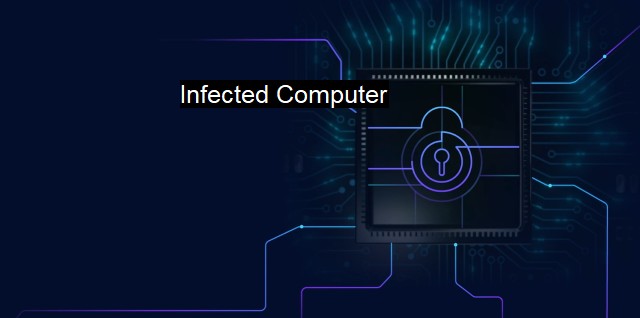What is Infected Computer?
Antivirus Protection: Defining Infected Computers, Understanding the Threat they Pose, and the Role of Antivirus Programs in Securing your Digital Life
An infected computer refers to a machine or device that has been intruded upon or compromised by a malicious software, more commonly known as malware. These damaging intrusions could include viruses, spyware, worms, trojan horses, adware, and ransomware. this concept is of utmost significance considering the startling rise in the number and complexity of these malware attacks, emphasized by a noticeable surge in global cyber crimes.In simplest terms, a computer is deemed infected when a harmful code, designed by cybercriminals, successfully penetrates its defenses and lodges itself within its system. This malicious code, once embedded, can exert control over the system operations, steal sensitive data, or even cause physical harm to the hardware. The degree of harm is contingent on the intent of the cybercriminal and the strain of the malware used.
Often, an infected computer exhibits conspicuous signs. The speed of an affected system may become noticeably slow or unresponsive; applications could start acting erratically, frequently crashing, or unexpected pop-up windows could appear bewildering the user. Also, unauthorized or sudden changes in system settings and the disappearance of stored data are clear calling cards of an infected system.
Some infected systems however do not provide these stark indicators, making them harder to detect. They operate silently behind the scenes, often aiming at extensive data breaches, establishing botnets, or making the system a launching pad for attacks on other computers or networks. This variation underlines the sophisticated stratagem adopted by modern cybercriminals.
Cybersecurity primarily focuses on shielding a computer from such malicious invasions, aiming at erecting barriers utilizing firewalls, secure coding, or a plentitude of encryption techniques. By adopting these methods, cybersecurity essentially aims at predicting and preventing a possible attack.
Antivirus software, on the other hand, plays an integral role in identifying and eradicating malware that had infiltrated a computer system before the adoption of cybersecurity measures or despite them. Acting as detective and guardian, antivirus software continuously scrutinizes system operations, recognizing malicious behaviors and codes amid legitimate computing actions. If any suspicious activity is identified, the software swiftly insulates, quarantines, or eliminates the hazardous code, thereby "sanitizing" the system.
Today, the most reliable antivirus software is equipped with features such as heuristic analysis capabilities, which empower the software to recognize brand-new strains of malware, instead of just those in its database. It thus enables the proactive handling of previously unidentified threats.
Ignoring the significance of basic security precautions may lead to a system infection. Downloading files from unreliable sources, clicking on stealthy pop-ups and suspicious email links, and using outdated software or operating systems, are risky practices that increase the susceptibility of a system to malware threats. Therefore, an informed and proactive user is critically effective in preventing infection.
An infected computer is one that has been breached or corrupted by damaging external codes or malware. It poses significant threats with grave potential impacts including data loss, identity theft, drained system resources, or worst, a totaled hardware system. While cybersecurity mechanisms primarily act in a precautionary role, antivirus software is pivotal in detecting and eliminating threats before they cause irreversible damage. Creating awareness about risky behaviors and fostering safe browsing practices also hold the key in preventing computer infections. Despite the sophistication and escalating nature of cyber threats, effective management of system security can counteract these virtual predators, thus securing both individual computers and the broader digital landscape.

Infected Computer FAQs
What is an infected computer?
An infected computer refers to a computer that has been compromised by malware such as viruses, trojans, worms, or spyware. Malware can cause a range of issues from slowing down your computer to stealing your personal information.How can I tell if my computer is infected?
Some indicators of an infected computer include slow performance, frequent crashes, pop-up ads, unexpected toolbars or icons, and changes in your browser settings. Additionally, antivirus software can scan your computer and detect any malware that may be present.What should I do if my computer is infected?
If you suspect your computer has been infected, the first step is to run a full system scan with up-to-date antivirus software. The software should identify and remove any infections. In some cases, you may need to seek the help of a cybersecurity professional to fully remove the malware and repair any damage it may have caused.How can I prevent my computer from getting infected?
To avoid getting your computer infected, it is essential to keep your operating system, software, and antivirus up to date. Be cautious of opening email attachments or downloading files from untrusted sources. Additionally, be careful of phishing attempts, which aim to steal your login credentials or personal information. Regularly backing up your important data ensures that you can restore it in the event of an infection or other system issues.| | A | | | B | | | C | | | D | | | E | | | F | | | G | | | H | | | I | | | J | | | K | | | L | | | M | |
| | N | | | O | | | P | | | Q | | | R | | | S | | | T | | | U | | | V | | | W | | | X | | | Y | | | Z | |
| | 1 | | | 2 | | | 3 | | | 4 | | | 7 | | | 8 | | |||||||